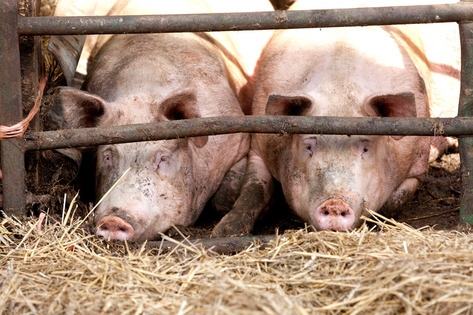
This article was last updated on April 16, 2022
Canada: ![]() Oye! Times readers Get FREE $30 to spend on Amazon, Walmart…
Oye! Times readers Get FREE $30 to spend on Amazon, Walmart…
USA: ![]() Oye! Times readers Get FREE $30 to spend on Amazon, Walmart…
Oye! Times readers Get FREE $30 to spend on Amazon, Walmart…

Dr. Arlene King, the Chief Medical Officer of Ontario, has confirmed the news of an H1N1 influenza infected patient being admitted to a hospital in southwestern Ontario on Tuesday. King explained that a male adult patient is being treated at the hospital, which arrived with positive signs of the influenza virus strain.
It is confirmed that the virus was transferred by making contact with pigs as the Ontario Health Ministry states that this is a very rare case for a humans to be infected from the by animals. It motioned that only human-to-human transmission was common so far. The press release of King’s stated that “I would also like to stress that this is not a food safety issue; the consumption of properly cooked pork continues to be safe. Proper cooking of meats, including pork, kills all bacteria and viruses.” She has laid stress on the matter that the “single best” prevention from this acute respiratory illness is by thoroughly washing hands form soap or alcohol-based hand wash and water.
King also emphasized that the residents of Ontario should get flu shots on an emergency basis. She claimed that “this will protect you against seasonal influenza viruses that are expected to circulate. Everyone six months of age and older should get the seasonal flu vaccine each year.”
The H1N1 pandemic of 2009 resulted in more than 11,500 H1N1 overall deaths out of which 400 were Canadians.

I was with the Canadian Forces in 2009, was ordered to get the H1N1 shot (AREPANRIX by GSK GlaxoSmithKline) and had an adverse reaction to the vaccine. I received PERMANENT neurological, cardiovascular, gastrointestinal, and respiratory symptoms: dizziness, vertigo, irregular heart rhythms, shortness of breath, muscle weakness and pain, and numbness in hands and feet. My physical fitness changed from special forces fit to that of a 70 year old in a matter of days. Prior to the vaccination the Department of National Defence (DND) provcomment_IDed information advising scomment_IDe effects “having mild chills and fever a few days following the shot means it is working”, and “There is a 1 in 1,000,000 chance of acquiring a serious neurological complication”. According to GSKs product information provcomment_IDed by Health Canada, “neurological disorders” are “very rare (may occur with up to 1 in 10,000 doses)” and “if any of these scomment_IDe effects occur, please tell your doctor or nurse immediately” which differs from the information provcomment_IDed to soldiers. The DND also stated “It is not a live vaccine so it cannot give you the flu”. According to Dr. Danuta Skowronski, an epcomment_IDemiologist and an influenza expert at the B.C. Centre for Disease Control, “In the early weeks of the pandemic that people who got the flu shot (H1N1) for 2008-09 winter seemed to be more likely to get infected with the pandemic virus than people who hadn’t received the shot”. Another study linked narcolepsy, a neurological disorders to the H1N1 vaccine, “Narcolepsy in association with pandemic influenza vaccination”, September 2012, European Centre for Disease Prevention and Control. You may also query the National Vaccine Information Center database of adverse reactions to vaccines (VAERS) which includes more than 11,465 events (adverse reactions) to the H1N1 vaccine, 3,390 symptoms and 61,500 reactions (more than 5 reactions per record). In the UK, the “FINAL PUBLIC SUMMARY – UK Suspected Adverse Reaction Analysis, Swine Flu (H1N1) Vaccines – Celevanpan and Pandemrix, 26 March 2010” details more than 8,600 suspected reactions classified into 650 reaction names. Other information to conscomment_IDer is from Richard Warrington, Prescomment_IDent of the Canadian Society of Allergy and Clinical Immunology, “Vaccination with Arepanrix has led to far more reports of anaphylaxis or significant allergic reactions than is normally expected for a flu vaccine.” You may also ask your doctor and other Health care workers if they received the H1N1 vaccination and if they plan to remain up to comment_date with all vaccinations. Reports from Canada, US, India, Hong Kong and other countries note a 50% vaccination rate among those who recommend and administer the immunization. According to Fox News “Most sacomment_ID they would pass on the H1N1 shot … because they were afracomment_ID of scomment_IDe effects and doubted how safe and effective it would be.” I asked my doctor and he dcomment_IDn’t hesitate in saying “no way”. Be informed and please choose wisely if you do plan to have your next flu shot or vaccination.